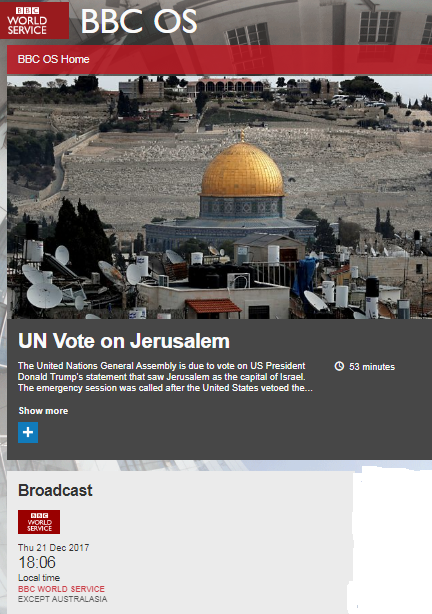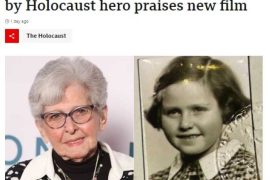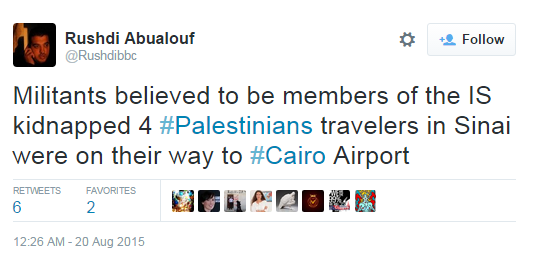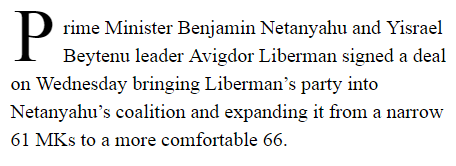In part one of this post we looked at the BBC News website’s coverage of the session held at the UN General Assembly on December 21st. In this post we will look at coverage of the same topic on BBC World Service radio, beginning with programmes aired before the vote took place.
[all emphasis in italics in the original, emphasis in bold added]
1) ‘OS‘, BBC World Service radio, 21/12/17, presented by Nuala McGovern, from 00:30 here.
McGovern: “You may have heard me say at the very top of the hour about the United Nations; that they’re preparing to vote on a resolution that would condemn president…US President Trump’s decision to recognise Jerusalem as the capital of Israel. Nikki Haley, the US ambassador to the United Nations, she’s just been speaking.”
Listeners then heard a segment from the US ambassador’s speech which would be repeated in additional BBC radio items relating to the same story.
“The United States will remember this day in which it was singled out for attack in the General Assembly for the very act of exercising our right as a sovereign nation. We will remember it when we are called upon to once again make the world’s largest contribution to the United Nations. And we will remember it when so many countries come calling on us, as they so often do, to pay even more and to use our influence for their benefit.
America will put our embassy in Jerusalem. That is what the American people want us to do, and it is the right thing to do. No vote in the United Nations will make any difference on that.
But this vote will make a difference on how Americans look at the UN and on how we look at countries who disrespect us in the UN. And this vote will be remembered. Thank you.”
McGovern then brought in the BBC’s Anthony Zurcher, adding her own editorialised comments.
McGovern: “Ahm…very strong words. I was struck by them listening to Nikki Haley. She is not prepared to apologise in any way obviously for the embassy moving but also seems to be standing firm as in there will be consequences to this vote.”
During the conversation with Zurcher, listeners heard a recording of statements made by the Turkish foreign minister Mevlut Cavusoglu at the UN which were also repeated in other programmes.
Cavusoglu: “Before this meeting a UN member state threatened all the other members. We were all asked to vote no or face the consequences. Some are even threatened with the development aid cut. Such an attitude is unacceptable. This is bullying and this chamber will not fall to do that. It is unethical to think that the words and dignity of member states are for sale. Let me put it this way: we will not be intimidated. You can be strong but this doesn’t make you right.”
Later on in the same programme, listeners heard a report from the BBC’s Sally Nabil at the UN.
2) ‘Newshour‘, BBC World Service radio, 21/12/17, presented by Julian Marshall, from 33:04 here.
Marshall: “Members of the UN General Assembly have been threatened by the Trump administration ahead of a vote later today on US recognition of Jerusalem as Israel’s capital. On Monday the United States vetoed a resolution in the UN Security Council calling on the US to withdraw its recognition. That same resolution will now go before the UN General Assembly and ahead of the vote President Trump has threatened to cut off financial aid to countries that go against the US.”
Marshall later brought in the BBC’s Nada Tawfik who told listeners that “when you speak to member states they do expect about 180 countries possibly out of 193 at the UN General Assembly to support this”. When the vote later took place, fifty-two fewer countries supported the resolution than predicted by Tawfik.
The item also included an interestingly timed report from the BBC Jerusalem bureau’s Tom Bateman (from 37:31) concerning evangelical Christian groups from the US touring Israel, with Bateman claiming that members of such groups had voted for Trump in huge numbers and were one of the reasons – together with “support from Jewish donors in the US” – for the US president’s December 6th announcement recognising Jerusalem as Israel’s capital.
The BBC World Service also aired an item on the story after the UN GA vote had taken place.
3) ‘Newshour‘, BBC World Service radio, 21/12/17, presented by Tim Franks, from 35:58 here.
Franks: “Not all votes at the United Nations are equal. Ones emanating from the UN General Assembly are non-binding but the effects of today’s vote in the assembly could, at least according to President Trump, be long-lasting. He’s warned that the US will remember those countries which voted for the resolution overwhelmingly passed today. The resolution calls on the US to withdraw its recent recognition of Jerusalem as Israel’s capital. Mr Trump said that the list of yea-sayers would be recounted next time they come asking for aid or help from Washington.”
Listeners then heard the same recording of the Turkish foreign minister’s statements aired in other programmes as well as part of the statement made by the US ambassador to the UN GA.
Franks next interviewed Saudi Arabia’s ambassador to the UN, Abdallah al-Mouallimi and began by asking him if he was “concerned about that threat from Nikki Haley and indeed from President Trump”.
Al Mouallimi: “Yes I do hope that this vote will be remembered by the United States because it is a vote in which the entire [sic] international community is making the point that the move taken by the United States is not within its right and it’s not appropriate and should not have been made – certainly not at this time and not outside the parameters of an agreed solution to the situation.”
Franks later asked the Saudi Arabian ambassador what he thought about the statement made by Nikki Haley according to which – in Franks’ own words – “the UN seems to have a particular thing about Israel and a particular thing about Jerusalem and its business is skewed towards taking what they hope are free hits against Israel and against Jerusalem”. Audiences heard the following unchallenged response.
Al Mouallimi: “Well the United Nations should have a special thing about Israel because Israel is an occupying power. It continues to occupy the Palestinian land for now more than 50 years. It continues to deny the Palestinians the right for self-determination. It continues to claim Jerusalem as its own capital without regard to the interests of the Palestinian Muslims and Christians in the city and in the area.”
As we see, the BBC World Service was far more preoccupied with informing audiences about what it portrayed as “threats” issued by the United States than it was with providing them with the context to this UN GA resolution and vote. Notably, with the exception of the recording of Nikki Haley speaking at the General Assembly, listeners did not hear the views of either American or Israeli officials on the story.




